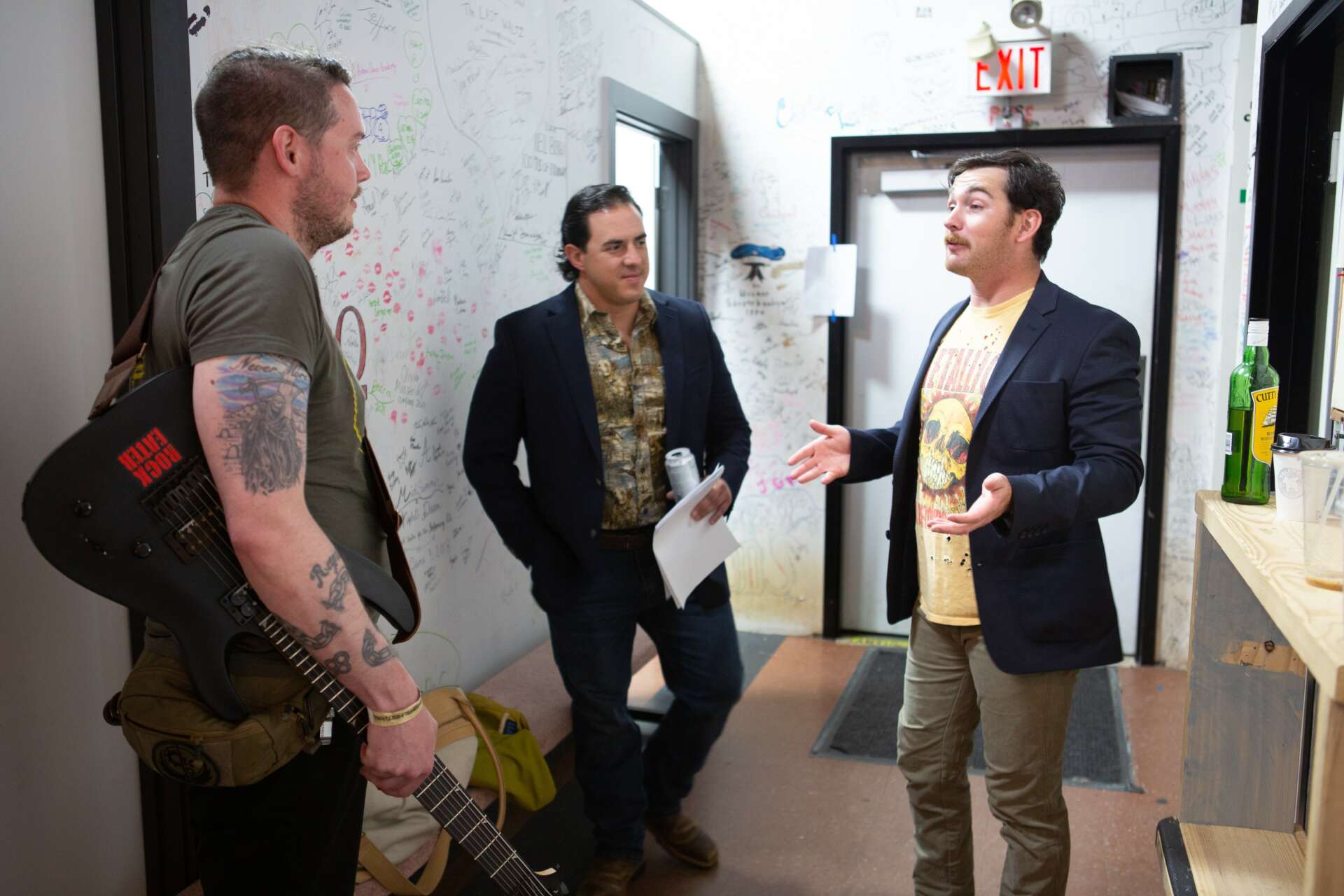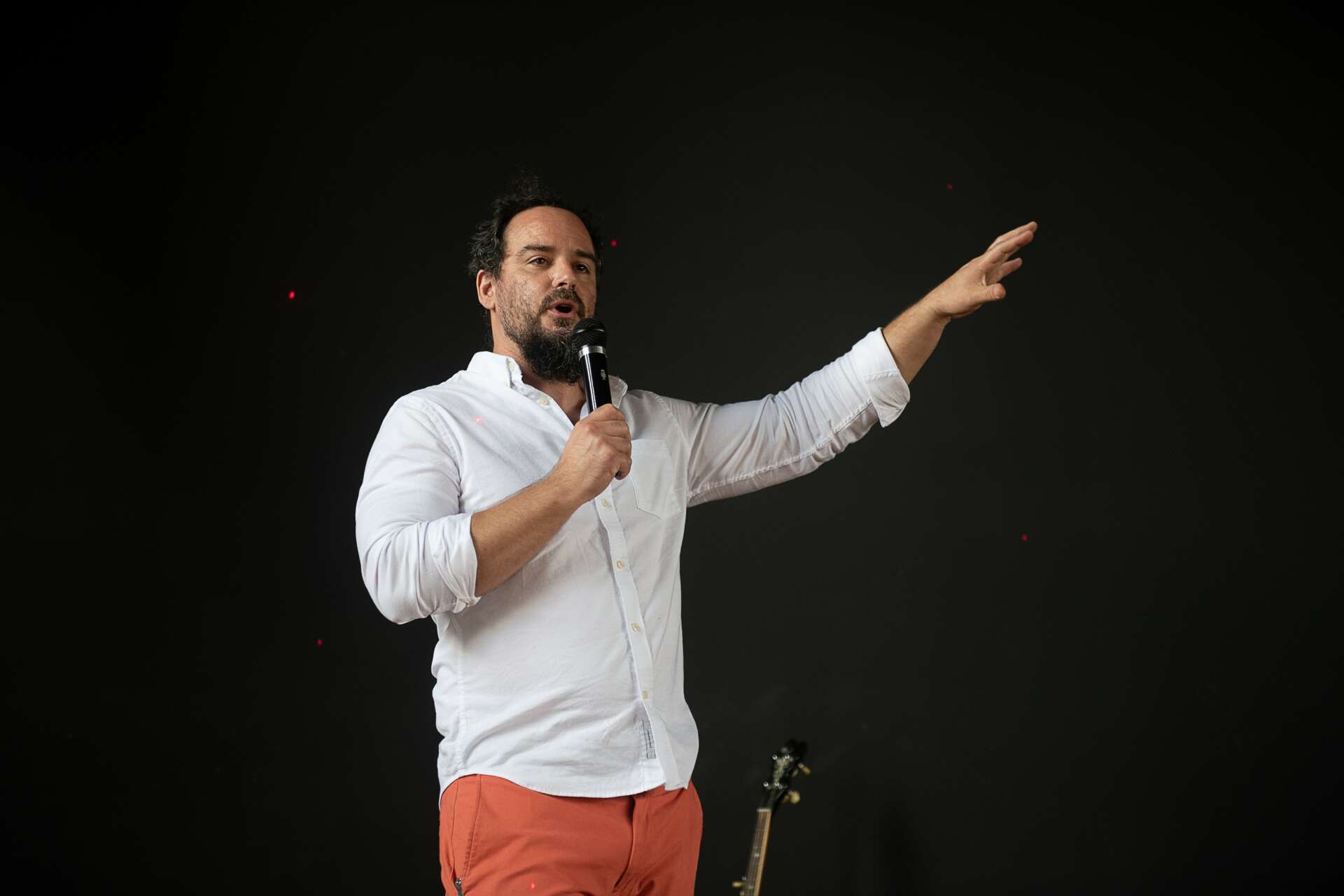We caught up with the brilliant and insightful Christopher Paul Meyer a few weeks ago and have shared our conversation below.
Hi Christopher Paul, thanks for joining us today. We’d love to hear about when you first realized that you wanted to pursue a creative path professionally.
The glib answer is that I’m the third generation of theater folk in my family so if I hadn’t run away to join the military, the actor’s life was kind of my default setting growing up. The longer answer is that I never took the arts all that seriously growing up because I knew I’d probably end up there. So I studiously avoided the theater club or taking acting classes. I turned down any possibility of an acting career until after I graduated from college. At that point, I felt like it was the time for me to take the artistic path seriously and really invest in myself as performer. I decided to focus mostly on stand-up comedy though, since the idea of being my own actor, director, writer and producer really appealed to the control freak side of myself. Over time, I allowed myself to do more and more theater, first as an actor and then as a director. I directed my first play – a comedy – off-off-Broadway at a little nothing theater in midtown New York. I really enjoyed the rehearsal process, really enjoyed the whole experience and we opened to really solid crowds and a really nice response for our whole opening weekend. We were dark Monday and then Tuesday a couple of assholes flew some planes into the World Trade Center and that pretty much killed the play, the theater and my directing career. I ended up making a lot of decisions that led me into the military and it was 20 years later before I had the opportunity to return to the theater.




Great, appreciate you sharing that with us. Before we ask you to share more of your insights, can you take a moment to introduce yourself and how you got to where you are today to our readers
I was transitioning out of the military and I needed something that was going to be the job I would do for the next 40 years and I never forgot that the most fun I’ve had in my life was doing theater – the collaborative process of working with like minds to do something that complete strangers will enjoy the hell out of is a really gratifying process, so I knew I wanted to go back to it – the question was how. When I looked around, the theater landscape had changed a lot in the 20 years since I’d been gone – I had changed a lot in the 20 years since I’ve been gone, hell, the country had changed a lot in the 20 years since I’d been gone so it only made sense if that if I was going to come back to the theater, I needed to find that community of like minds and shared understanding – and that needed to be the veteran community. That’s how Veterans Repertory Theater was born.
Then the question became, “Well, who are the veterans? The actors? The staff? The writers?” It made the most sense to start with the playwrights, since they are the chefs of the theater. We didn’t care what subject matter the playwrights wrote about and we didn’t care about genre. We just wanted great writing, so we launched our on-going full-length and ten-minute playwriting competitions to find, assess, select and produce the best writers and plays we can find. We also needed to figure out who the veterans themselves were. We ended up with a very liberal definition that included everyone in the profession of arms – military, law enforcement, fire, EMS, Department of Defense contractors and employees, intelligence services, and even the foreign service and their immediate family members.
Because it was 2021, we started do a podcast in support of the theater and we started to discover that there were a lot of veterans doing really cool things in the live performance arts that were not theater – music, dance, poetry, spoken word, visual art – and I thought that stuff nested pretty well in the communal experience of theater, so we started building a platform that really curates and produces for all of these art forms.
One thing we were very clear on from the start is that we were not for hobbyists, we were for professionals. There are a lot of great, great organizations out there that do art therapy work for veterans and that’s crucial, necessary, awesome work – and probably step one on a veteran’s path to being a fully realized artist. But we’re there for when a veteran really wants to start their work with a public, paying audience of strangers. I always say we are not an organization that exists to help veterans – we are veterans that are trying to help the audiences by adding more voices to the cultural landscape. When I talk about bringing veterans into the theater and live performance arts, I think the obvious question is, “Why?” For me, the answer lies in what makes veterans special. It’s not that a veteran is more talented, faster, or better-looking that anyone else. As best as I can tell, what makes a veteran special is the high number of significant emotional events that occur in a relatively compressed period of time and relatively early in a veteran’s life. That mix gives a veteran a relatively rare insight into extreme human emotions. Well, that’s theater. That’s drama. That is experiential wisdom that can be captured for the benefit of appreciative audiences in ways that transcend the classic “no shit, there I was” stories.
: Is there a particular goal or mission driving your creative journey?
I’ll take the scenic route to answer that question. A few years ago, the veteran poetry movement really exploded and veterans started realizing how cool poetry was to capture their thoughts succinctly and powerfully. And that’s why now, there’s probably more poetry coming out of the veteran community than the Ivy League. Well, we’re trying to do the same thing for live performance. For a long time, theater and the performance arts have been the purview of the high school theater clubs and very specific parts of the country. We’re trying to make American theater for all of America again and make sure that these very underrepresented voices in the veteran community see a viable future in the live performance arts – again, not because veterans necessarily have better stories to tell than the ones currently on stage, but there are just a lot more stories than what we see on stage nowadays. It’s a damn shame that veterans’ experiential wisdom and innate appreciation of the human drama doesn’t make it onstage more often. That doesn’t mean we’re trying to do Platoon onstage every night either. It just means that if a talented veteran writes a romantic comedy, it’s probably going to be different than a romantic comedy you would get from someone without those life experiences. I should also say that there is a natural marriage between veterans and the theater since both are so rooted in love of community and building a shared understanding in that community.




We often hear about learning lessons – but just as important is unlearning lessons. Have you ever had to unlearn a lesson?
It’s interesting a lot of the motivation for VetRep really came from love – love of the veteran community, love of the theater, love of our Hudson Valley base of operations. Coming out of the military with a combat deployment that ended pretty soon before I got out, I was in the headspace where I wanted to be kinder and more considerate in my new civilian life – no need to be a hardass, it wasn’t life and death we were dealing with, etc. So I ended up giving people the benefit of the doubt, extending a lot of opportunities to people because I’d see talent in them – but without really spending the time to assess their motives or aspirations. And that ended up disappointingly ever single time. It’s never wrong to be street smart, it’s never wrong to make people prove that they really do have your best interest at heart before you extend opportunities to them, it’s never wrong to determine that they really do understand your mission and really are behind you before you link up with them. What we realized is that, generally, more than talent or skill, we needed people with enthusiasm and drive – and we found that mostly, I guess unsurprisingly, in the veteran and veteran-adjacent communities. So we made a point of identifying the folks that were worth investing in and giving opportunities to. So we’re still motivated by our love for the veteran community, the theater community and the local community, but – whether it’s donors, sponsors, employees or partners – we’re not really into unrequited love affairs. We’re not going to go chase people down and beg them to work with us. If you get what we’re doing, awesome come on board. If you don’t, no harm, no foul, it’s just probably not going to be the right fit at this time.
Contact Info:
- Website: https://vetrep.org
- Instagram: @vetreptheater
- Facebook: @veteransrepertorytheater
- Other: SavageWonder.com, SavageWonder.substack.com, SavageWonder.captivate.fm
Image Credits
Christopher Duggan Diamond Grade Media


